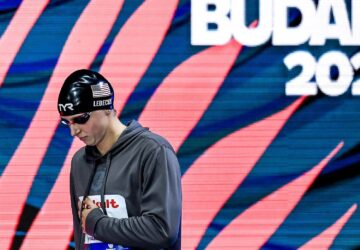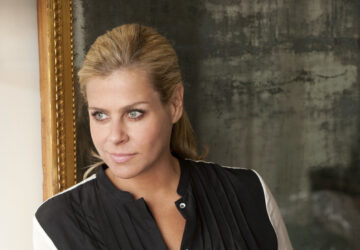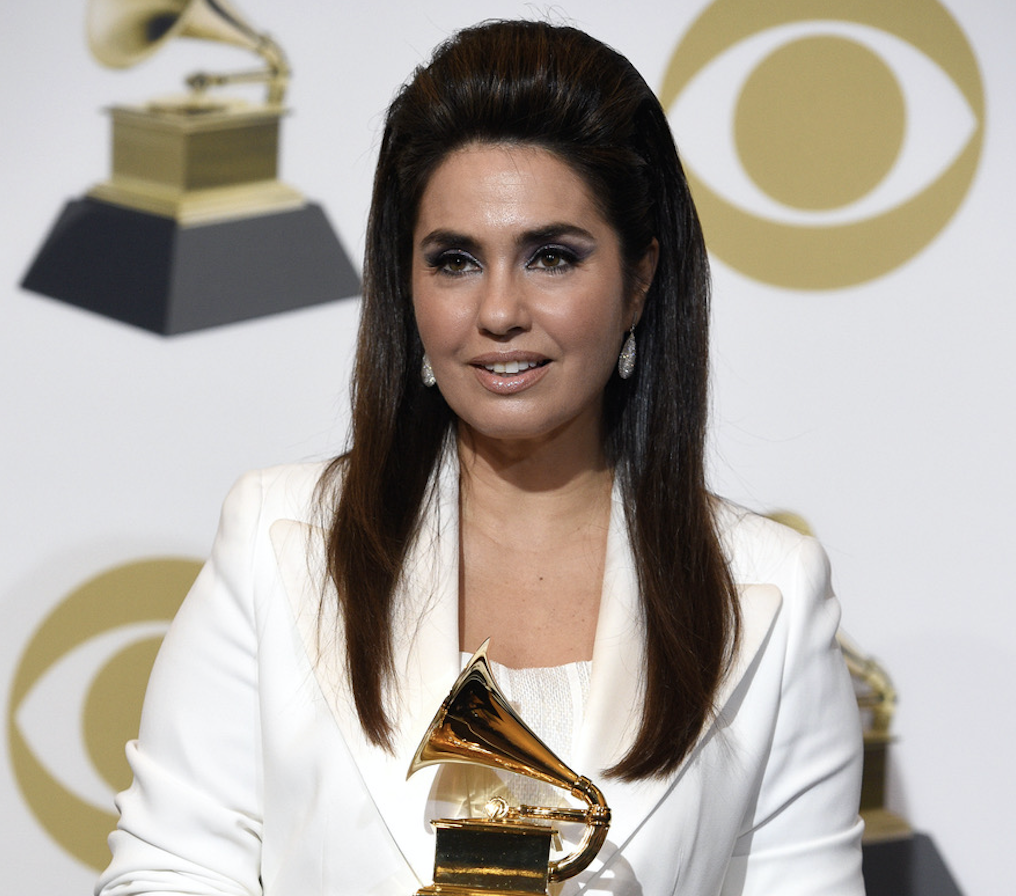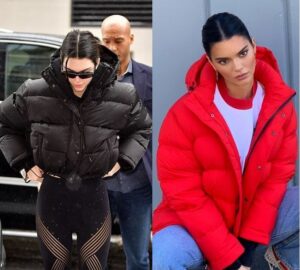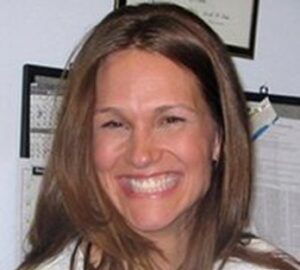Five Questions With Emily Lazar, Grammy-Award Winning Mastering Engineer
By Chloe Cornell
Emily Lazar is a Grammy-winning mastering engineer and the founder, president, and chief mastering engineer of The Lodge, an audio mastering facility she founded in 1997 in New York City. Emily made history this year when she won the Grammy for Best Engineered Album (Non-Classical) for her work on Beck’s album “Colors.” This marked the first time that a female mastering engineer won in that category. The win was so notable that Host Alicia Keys offered a special “shout out” to Emily during the telecast.
Emily has broken numerous glass ceilings during her 25 plus years working in the music industry. In 2012, with her nomination for the Foo Fighters’ album “Wasting Light”, she became the first female mastering engineer in history to be nominated in the Album of the Year category. In 2014, she was also the first female mastering engineer to be nominated in the Record of the Year category for Sia’s hit, “Chandelier.” In 2016, she was awarded a nomination for Best Engineered Album, Non-Classical, for her work on the album “Recreational Love” by American indie pop duo, The Bird and the Bee.
Her expertise has been recognized throughout her career in multiple interviews, articles and awards. In 2012, Emily won the Technical Excellence & Creativity (TEC) Award in the “Record/Production Album” category for her work on Foo Fighters’ Wasting Light. In 2014, she was nominated for the Master of Mastering Award (Mastering Engineers Award) at the first annual Pensado Awards show. In 2015, Emily was featured in the December issue of Billboard Magazine‘s “Women in Music: Hitmakers from Behind the Scenes.” This issue highlighted those honored at Billboard’s Annual Women in Music Event. In 2016, Emily Lazar won the Technical Excellence & Creativity (TEC) Award in the “Record/Production Single or Track” category for her work on Beck‘s Dreams. In the June 2017 issue of Elle magazine, Emily was one of fourteen women featured in the article titled, “The Women in Music Power List.” The list contained “the industry’s most influential executives, producers and songwriters.” In early 2019, prior to taking home the coveted Grammy for Beck’s “Colors,” Emily also won the Technical Excellence & Creativity (TEC) Award in the “Record/Production Album” category for her work on that album.
Her discography includes more than 3,000 albums comprised of esteemed artists such as Destiny’s Child, Missy Elliot, Sia, Beck, David Bowie, Madonna, Foo Fighters, John Mayer, Dolly Parton, Third Eye Blind, The All American Rejects, Tïesto, Vanessa Carlton, Paul McCartney, The Prodigy, Barbra Streisand, Wu-Tang Clan, Lou Reed, Morgan Page, Maggie Rogers, Vampire Weekend and many, many more.
A graduate of Skidmore College, Emily majored in English with a concentration in Creative Writing and minored in Music. She received her Masters Degree in Music Technology from NYU, where she was also the Graduate Fellow. Later, Emily was invited back to NYU to join the faculty and taught advanced graduate level coursework in the Music Technology program. While in college and graduate school, Emily was a songwriter, performed with her band, and worked as a freelance engineer, producer and mixer. I was so excited to talk to Emily fresh off of her historical Grammy win!
Chloe: Congratulations on winning a Grammy – and making history! As we wrote about in this month’s issue, this year’s Grammy Awards was the year of the woman between Alicia Keys hosting the event – the first woman to do so in a decade, all of the female nominees and wins in the major categories, and all of the female performances. It must have made your win feel extra special in that company. Can you tell us about your experience that night, and the week leading up to it? Any cool behind-the-scenes anecdotes that you can share with us?
Emily: Thank you! I’m very honored to have won a Grammy in the Best Engineered Album category. For me, the award in this category is a truly meaningful accomplishment because it honors those involved behind the scenes in the craft of making an album. It was even more exciting considering that this year was such an extraordinary Grammy year for women. I am so very proud to have been a part of it.
Grammy week is filled with extraordinary events leading up to the big night at the awards show. One of the standouts for me this year was the Recording Academy’s signature charity event for Musicares, which honored Dolly Parton with its “Person of the Year” award. I mastered Dolly’s latest album, “Dumplin’”, which is the original motion picture soundtrack for the film “Dumplin,”starring Jennifer Aniston. Dolly is as warm and charming in person as she is known to be. Not only is she is a very intelligent woman, known for her great business acumen, but she is a huge artistic talent as a songwriter, performer and producer. Not surprisingly, Dolly assembled an amazing team for this album – and it just so happened to have a lot of women involved! I’m very grateful to have worked together with Dolly’s All-Star crew: hit-maker and producer, Linda Perry (Pink, Christina Aguilera, Miley Cyrus, Ariana Grande) and awesome mix engineer, Billy Bush (Garbage, Lupe Fiasco, Dweezil Zappa). The giant hug she gave me on the red carpet prior to the evening’s festivities is a moment I will never forget.
A really funny behind-the-scenes moment occurred right after I won my award. After I went backstage I was ushered through various hallways to an elevator to head toward the press room. Just as the doors were closing two more people jumped into the elevator. One of them was none other than my dear friend from elementary school, Andrew Wyatt. We have kept up with one another through the years, but we both keep pretty busy schedules, so our chances to catch up are limited. Andrew recently won a Golden Globe, a Grammy and an Oscar for the song “Shallow” (which he wrote with Lady Gaga, Mark Ronson and Anthony Rossomando) and right after winning his Grammy he had been ushered into the same elevator! After a big hug he proceeded to announce to everyone in the elevator that he and I were grade school crushes back in the 5th grade! So… while you’re sitting in class daydreaming, look to your left and right and take note of who you see, you never know, you may meet up again backstage at the Grammys!
Chloe: So you are the founder, president, and chief mastering engineer of The Lodge. Can you explain what a mastering engineer is? How did you decide to go into this field?
Emily: A mastering engineer, by its simplest definition, prepares a piece of recorded music for mass distribution across multiple commercial physical formats and digital media. This final post production process is accomplished by using many analog and digital tools including but not limited to: compressors equalizers, limiters, and phase manipulation to enhance the stereo image.
In other words, a mastering engineer puts the final touches on recorded music before it’s released to the public. You could liken it to some of the post-production processes that happen in film. After a track is recorded, it gets mixed and then it gets mastered. The mastering engineer is responsible for making sure that all of the songs work together on an album and tell a story, and that they all have the particular sound that the artist is looking for. Mastering is the final step in the process — the last opportunity to fix or address any issues that the artist may have before giving birth to the beautiful “baby” that the world will hear. My approach to mastering is first and foremost, to create an open dialogue with the artist, producers and mixers so that we can all work together to get to the results they want to achieve. That dialogue allows me to have both a broad and specific view of what the team has in mind all at the same time, and it is that conversation that really determines the final overall sound.
When I first started out in music I was a performer and a songwriter. When my band would go into the studio to record my songs, the results weren’t particularly satisfying and the process left me confused. I knew what I wanted them to sound like, but there was a disconnect between the sounds I heard in my head and what came out of the speakers. I got into recording and engineering because I was frustrated. I wanted things to sound a particular way and I didn’t feel that my ideas were being translated into the final product. The studio culture back then was not particularly ingratiating to young women with an opinion about what they wanted to hear. Actually it was pretty intimidating. Perhaps necessity truly is the mother of invention, or at least it was for me, because some of my experiences with the engineers I encountered served as the inspiration and catalyst for me to figure it out on my own. Along with the many engineers that were not helpful, there were a few engineers that were very supportive of my desire to learn and I am super grateful to them. One of them was an engineer named Keith Cleversley (Flaming Lips, Hum, Mercury Rev). He was really supportive and reminded me that it simply didn’t matter that I was the only woman enrolling in a class, interning in a studio as an engineer, or even going to a music store to buy an electric guitar. It seems silly, but just those few words of encouragement had a very large impact on me. As soon as I began studying engineering I was amazed by the freedom this new knowledge afforded me. I could actually be in artistic control of what my music sounded like! It felt powerful. I went from being filled with self-doubt to saying “Yeah, I can do this, I can rock this.”
I was on a mission to absorb everything I could and started working (for free) in some of New York City’s most prominent studios. That was an amazing education. I was able to see different engineers go about the same task in different ways. I wanted to know more about every aspect of engineering so I decided to go to school to pursue my Master’s Degree at New York University and enrolled in their Music Technology program. After graduating, I worked at a well known mastering facility in New York City. It was a great opportunity for me to learn and formulate my own ideas about a better way of making albums. It turned out that my vision of how things should happen in the studio didn’t exactly align with what the majority of studios at that time were doing. It was 1997 and things were pretty different than they are today. In response to that, I founded The Lodge. I created a boutique studio environment where artists could come in, feel understood and catered to. A place where they would be able to hang out with people that know music, care about music, and love music. I felt mastering was a very creative part of the process and that it was very much about storytelling.
Chloe: It is unusual to be a woman in your field. I read that only 2% of music engineers are women. Prior to the Grammys, The Annenberg Inclusion Initiative released their latest study which focused on the problems women face in the recording studio. In production jobs, which includes engineering, producing and songwriting, 43% of responders said that being taken seriously was a barrier of entry, as well as sexual harassment and challenges to their vision. What are some biases that you’ve had to overcome? Were you involved with the Time’s Up moment at last year’s Grammy awards? Are things improving? Do you see any changes happening in the industry?
Emily: Unfortunately, I have witnessed and experienced harassment and belittlement during my career. It is still tough for women in the music industry. The #MeToo movement has not affected the music industry as powerfully as it has some other industries. I know personally that we have not uncovered half of what goes on in the studio. Last year at The Grammys a bunch of people came together to make a statement of support for the #MeToo movement and we all chose to wear white roses in solidarity while on the red carpet. I think it got some positive attention but it was certainly eclipsed by the drama that ensued after the public’s backlash against both the lack of female nominee representation in the categories in general as well as in the broadcast. There is cause for optimism, however, because after last year’s obvious lack of female nominees the Recording Academy created a diversity task force to investigate the problem and search for solutions. The Recording Academy has also just launched “Women in the Mix,” an initiative that encourages industry influencers to consider at least two female candidates when hiring engineers and producers. I proudly referenced “Women in the Mix” in my speech when I accepted my Grammy. It is both significant and admirable that the industry is committed to making progress and as you saw at the Grammys, women such as Alicia Keys, were there in force and celebrating each other.
After my win, The New York Times quoted me as saying, “I am so grateful to get to be one of the people… that young women see and they can say, ‘I can see it. I can be it. That’s a cool career, I want to go do that.” And that quote really speaks to a big part of the problem – if you don’t even know a career exists how can you aspire to do it? Being a female role model is so important to me. I’m always excited and enthusiastic to have women join the technical side of the industry and while I was personally committed to hiring women well before the formation of “Women in the Mix,” I believe this heightened awareness will definitely help the next generation of female musicians, producers and engineers. In addition to supporting “Women In The Mix” I am proud to be included on the list of Creators for “She Is the Music,” an organization focused on inclusivity in the music industry. I also serve on the New York Chapter of the Recording Academy’s Board of Governors as well as on the Recording Academy’s National Steering Committee for the Producers & Engineers Wing. I am very proud to volunteer and participate in this advocacy work, as I know how great it would have been if there had been a welcoming community for me back in the day, as it was pretty scary, and certainly lonely. In all aspects of the music industry, it’s a difficult road for women. Obviously, it’s not particularly appealing when something sexist happens to you. But if you’re strong enough, you can keep your goals in mind and remember that you’re doing your job – whatever that is, whether you’re a producer, an artist, a mix engineer, or a mastering engineer – because you love it, and no one has the right to take that from you. I think the landscape has changed a lot already and I am hopeful that the next generation of women will continue to speak out and have a better, more positive work environment. And, most importantly, if it’s not an acceptable, appropriate, positive environment, well… go build your own place that is!
Chloe: What/who was your first big break? How did that lead to more business? Who were your mentors/inspirations? What were your favorite projects/people that you’ve worked with?
Emily: I can’t really pick one album over another. They all have been so special and have contributed to my process and my personal growth in a really meaningful way. My work with Beck on his incredible album, “Colors,” was very special. The reason that The Lodge was created was to cater to artists like Beck, who are extraordinary, have remarkably great ears and have an incredible sense of what they want. He put a great deal of time into this album, which I believe was time well spent. He was able to investigate, with his specific attention to detail, to get to exactly what he was looking for. It’s what we’re lacking in most music production right now. I think a lot of today’s artists release their music without taking the time that is necessary to truly craft things properly. I have such deep respect for Beck in that he takes the time to make sure that his final product truly says what he wants it to say, musically speaking.
Chloe: How would you advise someone who is interested in pursuing a career in music/master engineering to go about breaking into the field? What kind of skills/experience/personality traits do you think are essential to be successful? Any other advice?
Emily: To be successful in any career you need to be able to think on your feet, be flexible, be empathic to your colleagues, work harder than you thought you could, and to NEVER, EVER GIVE UP!


